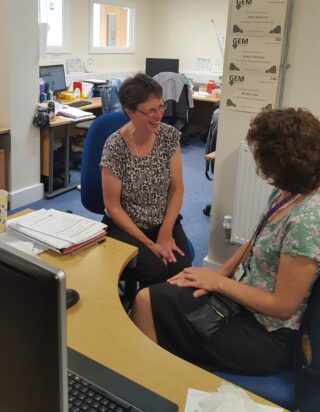Kate Lock, a Senior Project Manager with experience implementing improvement projects in Emergency Departments, shares her journey and invites people to join the Urgent and Emergency Care Special Interest Group she has launched. (See full list of SIGs).
How – and why? – did you first get involved in improvement; and what has been your journey since then?
Using improvement methodology and data is second nature to me and I can’t imagine trying to run a project without it
I first got involved in Improvement when I was working on GP Collaboratives, where John Oldham was leading the national change programme supporting GP practices to enable same day appointments for patients. I was then fortunate to have the opportunity to attend an IHI conference in the US which I thoroughly enjoyed and there has been no looking back since then. On my return from the US I applied the skills that I had learnt when I later lead the health and social care team in East Devon where I used measurement and small tests of change to improve the service for clients and patients. I also had the great privilege of being coached by John Keast who has done a tremendous amount of improvement work in Devon. Since then, I have applied my improvement skills leading the out of hours GP services in Devon and Cornwall, the healthcare services in prisons in Devon, and now here in Taunton. Now using improvement methodology and data is second nature to me and I can’t imagine trying to run a project without it.

What most inspires you professionally?
I passionately believe in an NHS that is free at the point of contact, and I believe that is only possible by making the most of every patient contact and every NHS resource. This guides my approach to work and inspires me to do everything I can to ensure that we don’t waste patients’ time, clinicians’ time or other scarce NHS resources. As an improvement advisor I can help improve the way our services function to achieve this.
Can you share a hard-won lesson you’ve learnt about what makes for a successful (or unsuccessful) improvement project?
I will start with my lesson about what not to do. Some years ago I was involved in a 6 month service review where we did extensive patient consultation, gathered literally piles of evidence, did lots of detailed analysis but absolutely nothing changed or was achieved as a result.
We gathered literally piles of evidence, but absolutely nothing changed or was achieved as a result
I have spent a great deal of time reflecting on what the lesson was from that experience, and believe that the root cause was that we were trying to achieve too much in one go.
We were trying to achieve whole system change in one fell swoop rather than improving the system by smaller systematic and iterative changes. I now focus on small PSDAs rather than tackling the whole system at once. Having learnt from that experience, my recent work in the emergency department improving our performance against the 4 hour target has been really successful and I put this down to a great team, great data and small PDSA cycles.
What change could we make that would do most to embed continuous improvement in health and care?
I think we need to ensure that we use the data that we already collect to constantly monitor performance to see whether changes are improvement and the improvements we have implemented are being sustained. This will also allow us to make informed and timely decisions about any changes that we need to make. In urgent care, which is where I work, we also really need to engage all members of staff in the conversation about how to improve care, listening to them and making them part of the process.
We also really need to engage all members of staff in the conversation about how to improve care
Why did you join Q?
I joined Q as it will be great to work together and collaborate with other people experiencing similar challenges. It is a great forum for us to share more about the work that we are doing here at Musgrove and learn from the experiences of others.
What new connections (and collaborations) have you made as a result of joining the Q community – and what have you learnt so far?
Since joining Q I have been to several meetings and training sessions and had the pleasure of making contacts at other trusts. Most recently I’ve been in touch with Matthew Mezey (Q Community Manager) who has been extremely helpful in supporting me as I set up the new Urgent and Emergency Care Special Interest Group (SIG), which I’m very excited about.
Can you tell us about something you’re currently working on (that Q members might be able to help with/feed into/learn from/contribute to)?
I’m starting an Urgent and Emergency Care SIG to provide a forum for people working in this space to get together, share and collaborate. Urgent and emergency care is an area of focus and central to the performance of all acute hospitals, and it’s critical for the health of our patients, and the sustainability of our hospitals that we get it right. It’s also a politically important and high profile. I would invite any members of Q with an interest in or working in this space to join the SIG. We would also welcome non-Q practitioners to join the SIG so if you know someone who you think would benefit from being part of our Urgent and Emergency Care community, then do put them in touch with me.